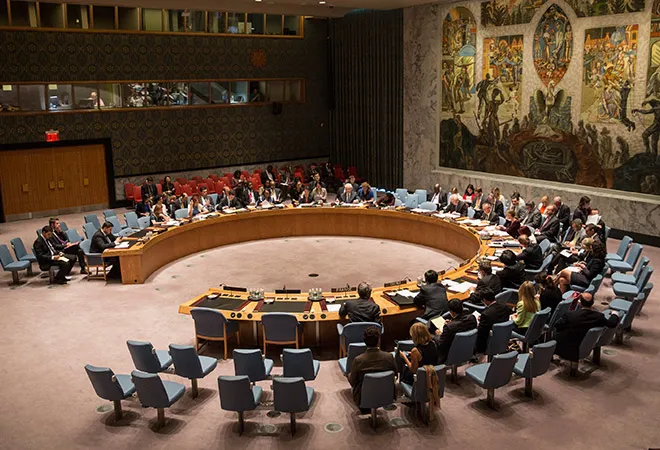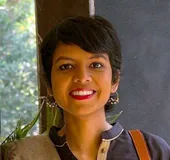
The lack of progress with listing Jaish-e-Mohammad (JeM) chief Masood Azhar with the 1267 sanctions committee of the United Nations Security Council (UNSC) has become a source of deep consternation for India. China has, so far, blocked efforts to blacklist him four times, and has criticized a parallel US-led initiative to do so under the regular process of the UNSC. A part of the problem can be attributed to China’s power politics at play here; they aim to help its ally Pakistan by shielding Azhar from sanctions measures. However, a larger part of the problem arises from the structural, procedural and systemic issues that emanate from the way sanctions committees and other subsidiary bodies of the UNSC function.
A part of the problem can be attributed to China’s power politics at play here; they aim to help its ally Pakistan by shielding Azhar from sanctions measures.
The working procedure of the committees lack uniformity and transparency, and adopt decisions on the basis of an inherently flawed mechanism. As a result, the committees are more opaque and cumbersome than their parent body, which – as pointed out by Amb. Syed Akbaruddin (India’s Permanent Representative to the UN) - calls into question their accountability, efficiency and credibility.
The UNSC has been given the responsibility of maintaining international peace and security, and has the power to achieve this objective by adopting a variety of binding measures, including sanctions. Over the years, sanctions measures have evolved to adopt a more “targeted” approach to apply strictly to rogue individuals, organizations and companies. As a result, subsidiary organs with the UNSC known as sanctions committees were set up to consider the listing and delisting of suspect entities, and to monitor and implement sanctions against them.
Currently, there are 14 sanctions committees under the UNSC, tasked with various responsibilities such as political settlement of conflicts, nuclear non-proliferation and counter-terrorism. Sanctions committees comprise of all 15 members of the Security Council, and each committee is chaired by a non-permanent member on a rotational basis. Their work is guided by specific mandates, which list out the functions that they have to carry.
The ISIL (Da-esh) and Al Qaida sanctions committee, also known as the 1267 sanctions committee, oversees sanctions measures related to individuals, entities and groups, associated with the aforementioned organizations. The committee can impose measures like asset freezes, travel bans and arms embargoes, and has presently listed 262 individuals and 83 entities in its sanctions regime.
The ISIL (Da-esh) and Al Qaida sanctions committee, also known as the 1267 sanctions committee, oversees sanctions measures related to individuals, entities and groups, associated with the aforementioned organizations.
The Committee functions on the basis of adopted guidelines, which govern the process of holding meetings, decision making, and sets forth the criteria for listing and delisting associated individuals and entities.
Two issues arise from the decision making process adopted by the guidelines of the committee. The first is the requirement to undertake decisions by “consensus”; this means that a decision is adopted if no objection has been raised against it. This requirement effectively gives a veto to all 15 members of the committee, and not just the permanent members (P5) alone. This is a higher threshold for decision making as compared to regular meetings of the UNSC itself, where a vote of 9 is required for procedural matters and a vote of 9 (inclusive of P5) for all other matters. It places the onerous condition of obtaining the concurrence of all 15 members of the committee to enable a decision to go through.
The first is the requirement to undertake decisions by “consensus”; this means that a decision is adopted if no objection has been raised against it.
The second, is the ability of a committee member to place a “hold” on the decision should they require more time and information to consider the matter at hand. As per the guidelines, a hold can last for as long as 6 months at a time, but can be extended further under “extraordinary circumstances”. Apart from this vague condition, there is no restriction on repeatedly invoking a hold which is why China has been able to block the decision 4 times so far.
The second, is the ability of a committee member to place a “hold” on the decision should they require more time and information to consider the matter at hand.
There are two ways for a committee member to end a hold; one would be to tender a decision on the matter, by indicating its acceptance or objection. The second is when the holding committee member has ceased to be a member of the UNSC. The latter condition has no meaning for the P5 since, by virtue of being permanent members, they will always be a part of sanctions committees. Thus, the guidelines provide an upper hand to members of the P5 to block a decision in perpetuity.
The manner of conducting meetings and consultations at sanctions committees raise questions about their transparency and credibility. As per the guidelines, committee meetings take place in closed sessions, with no publication of the agenda, proceedings and voting records of the committee. This is in stark contrast with the regular meetings of the UNSC, which publish comprehensive records of their programme of work, meeting records, voting patterns and outcomes. It is understandable that sanctions committee proceedings may take place through informal consultations - to the extent they may affect legitimate privacy or security interests. However, there is no reason to provide a blanket cover of confidentiality to all deliberations since they deal with matters affecting public concern and international security. It makes it impossible for the larger membership of the UN to ascertain the rationale for decisions that are taken - or rather, not taken - and reduces the authority and legitimacy of these committees.
The manner of conducting meetings and consultations at sanctions committees raise questions about their transparency and credibility.
Over the years, certain problematic aspects of sanctions committees have been reformed. Initially, the chairmanship of the committees were assigned by the P5 – a requirement that was the source of much controversy. This was resolved in 2015, and the selection is now facilitated by 2 nominated members of the Security Council. Another issue was that, previously, the committees never gave any reasons for its decision to list or (delist) individuals or groups. This was changed through a UNSC Resolution which directed the committees in 2009 to provide “narrative summaries” to explain the reason for their decision.
Over the years, certain problematic aspects of sanctions committees have been reformed. Initially, the chairmanship of the committees were assigned by the P5 – a requirement that was the source of much controversy.
Thus, while reforms have been slow, they have been possible. An institution will only be as strong as process that governs it. For sanctions committees, which deal with important matters like terrorism and nuclear proliferation that require swift and efficient decision making, should be given a simpler and more transparent procedure to work with. Apart from improving the decision making process, there is a need for open consultations, information dissemination and circulation of summary records of meetings. In the Masood Azhar conundrum, the importance of diplomatic negotiations cannot be done away with. However, while looking for ways to resolve the issue, it is necessary for India and the rest of the UN membership to press for the need to reform the guidelines of sanctions committees and strive to make it more credible, legitimate and efficient.
The views expressed above belong to the author(s). ORF research and analyses now available on Telegram! Click here to access our curated content — blogs, longforms and interviews.




 PREV
PREV


